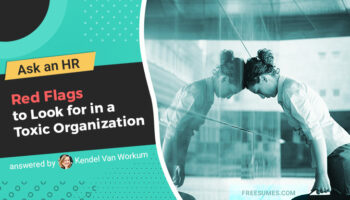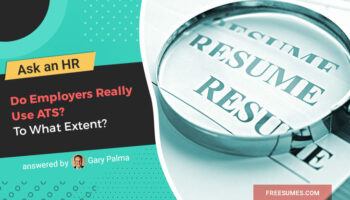There is no limit to the number of ways a resume can look unprofessional and otherwise be ineffective in achieving your objective to land the job interview. The most common errors are listed below, with remedies for addressing them.
Each week, we answer your most burning questions about job search, interviews, and career. Have a question for an HR but haven’t had the chance or courage to ask? Just tweet it to @freesumes with the hashtag #AskAnHR and we might feature your question and your tweet in our next edition.
1. Poor formatting and unusual fonts
Remedy – Optimize compatibility with Applicant Tracking Software (ATS) which is used by a large majority of employers and recruiters. It is likely that those not using ATS now will do so in the future. ATS has the capability to parse resumes to screen and match candidates to job needs. Once you submit your resume, the ATS will determine whether your candidacy will move forward or be rejected so early in the process. Optimizing ATS compatibility will cover formatting, fonts and many other solutions that will make your resume look professional to both human and artificial ‘eyes.’
2. Incomplete or incorrect contact information, inappropriate email address
Remedy – Ensure that your contact information is correct and your email address is professional.
3. Using an Objective Statement instead of a Career Summary
Remedy – Lead your resume off with an impactful career summary of the skills and accomplishments that you offer expressed in action words, instead of an outdated objective statement. Employers will focus on the skills and qualifications that you offer to advance the company’s success. So you need to design your resume around the employer’s needs and wants, not your own.
4. Too short or too long
Remedy – Your resume should be one or two pages. If you have more to say and present, add a cover letter, portfolio, website links, professional social media accounts, etc.
5. Using meaningless cliches, jargon, buzzwords, acronyms, slang, or other inappropriate language
Remedy – Another best practice is to adapt your resume to each job opportunity to which you apply. Integrate critical keywords, specifically the professional, technical, and academic hard and soft skills that are in the job posting you’re targeting and that you truly possess. Use action verbs for greater impact.
6. Misspelling, typos, poor grammar, and other mistakes due to not proofreading
Remedy – Proofread your resume, and all of your writing. Use spelling and grammar checking tools.
7. Ignoring employment gaps
Remedy – It isn’t necessary to go into detail about employment gaps, but do acknowledge them and offer an honest explanation such as layoff, acting as a caregiver, schooling or simply a career break.
8. Including your photo, salary information/requirements and references
Remedy – Your photo should be omitted in the US and many other countries. It may be appropriate in certain countries and in the international job market. References may be requested by the employer in the job application or later in the selection process. Salary discussions are best left until later in the process after the employer has expressed an interest in hiring you.
9. Including personal information and hobbies
Remedy – Your resume needs to emphasize your skills, work experience, education, qualifications, and any other assets that communicate your unique value to the employer. Including irrelevant personal information is unprofessional and takes up precious space.






